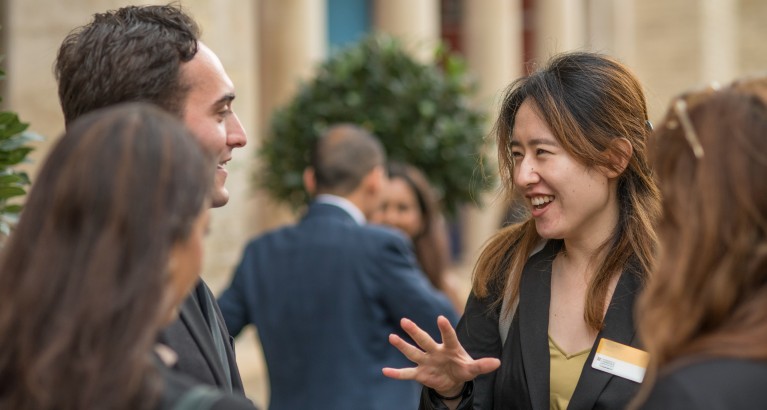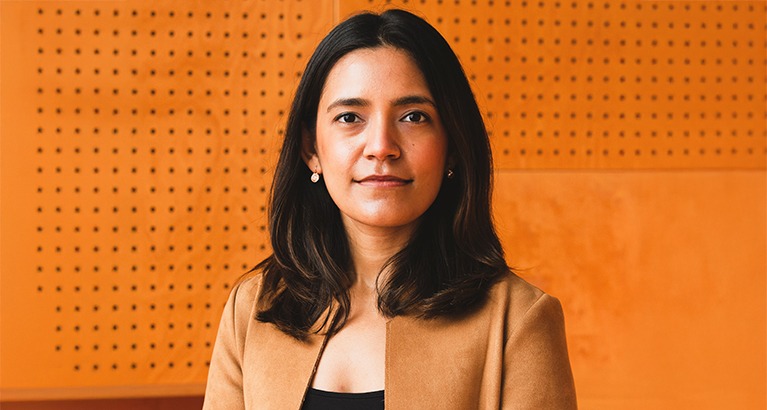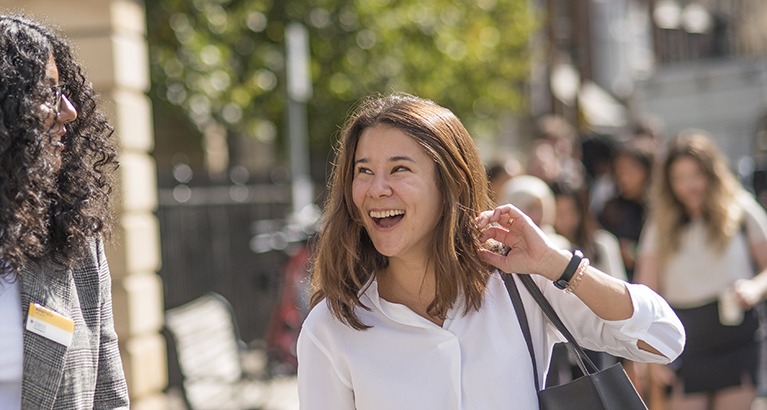Last year, it was announced that female representation on boards had reached a record 40% on the FTSE 350, marking significant progress. But there’s still more to be done – women-led companies represent just 17.3% of the UK total, according to The Gender Index. And the gender pay gap remains. Women get paid an average of 7.7% less than their male counterparts, according to 2023 figures by the ONS.
Role models are crucial in continuing to advance women in leadership – and that starts with a good mentor. Mentors can help build confidence, offer guidance on overcoming the obstacles and inspire mentees to achieve their goals – all while helping the mentor gain invaluable self-awareness too.
We spoke to 3 MBA graduates to find out about their experience mentoring, and how they believe mentorship can help address ongoing barriers for women in business.
Stephanie Groenke
MBA 2017 | Career & Leadership Coach
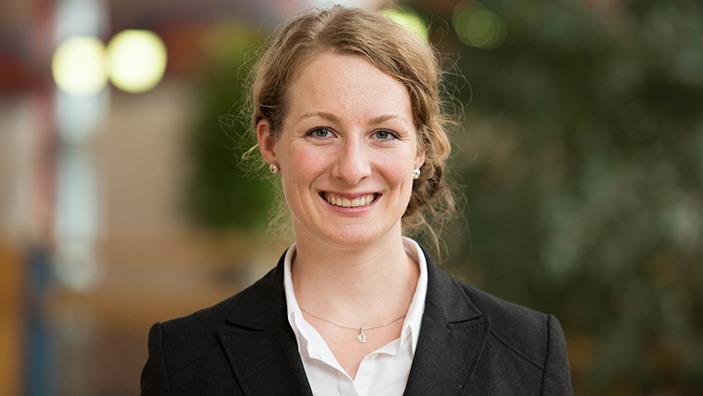
How did you become a career coach?
I knew since I was 19 that I wanted to help people feel lighter and follow their own vision of life. While I was on the MBA, I set up a mentoring scheme for our class under the Women in Leadership SIG (Special Interest Group), together with the alumni office. As a mentor, I came back a year later when the next MBA class asked me to host a careers workshop. This was my first paid engagement as a coach, and it grew from there.
What type of clients do you coach now?
I coach people at all stages of their careers – I’ve had clients from 19 to 66 years old, starting from those with three years of work experience through to entrepreneurs, senior managers and CEOs. The connecting theme is the values of the people I work with. They’re all ambitious individuals who want to go far in life and have a positive impact, without sacrificing their mental health.
You mentor both men and women – do you see men suffering from some of the same issues as women?
I have around a 50/50 split between male and female clients, and men definitely do need support too! Many of them also take on too much pressure and have deep-rooted imposter syndrome. They just don’t feel they can show it because of societal expectations.
What are the most common barriers you see among your female clients?
Combining a career with having a family is, in general, still more of a struggle for women than for men. Even in the professional world, women tend to take on more of the emotional work, which is often invisible and rarely reflected in salary increases. Many women also believe they can’t be successful without losing their more feminine traits, leading them to feel strained and lose their ease and creativity. I believe we need some structural changes in the professional world to better suit and reward the strengths of women.
What are the main benefits for those who get coaching?
The biggest benefit of having a coach or mentor is that you have someone who can help you build your vision. Coaches can see the blind spots that keep you stuck and work on them with you. That usually surfaces limiting beliefs, many of which were formed in our early years. The aim is to help clients transform these beliefs and live by new ones so they can achieve their goals better and faster.
What’s your biggest piece of career advice for men and women?
Do what fulfils you and be eager to grow and learn. Some become successful entrepreneurs by 25, others love their managerial job at 50. Life is too short to only live according to the expectations of others, so have the courage to do you!
Do what fulfils you and be eager to grow and learn. Some become successful entrepreneurs by 25, others love their managerial job at 50. Life is too short to only live according to the expectations of others, so have the courage to do you!
Yashaswini Palleti
MBA 2019 | Senior Business Development Manager

How did you get involved with mentoring while studying on the Cambridge MBA?
While on the MBA, I had the opportunity to participate in the Cambridge University Women in Business Society (CAMWIB) Mentorship Scheme. This initiative connects Cambridge University students with accomplished female mentors from across diverse industries, so I guided an undergraduate student through her Cambridge journey, for example.
When and why did you decide to join The Girls’ Network and what does the project involve?
I joined The Girls’ Network last year, after learning about its impactful mission – to connect girls from disadvantaged communities with female mentors and role models. As a mentor under the initiative, I have the privilege of helping teenage girls overcome obstacles and seize opportunities, providing guidance, encouragement and support.
How has being a mentor helped you to develop on a personal level?
Mentoring has been a transformative experience for me. Through guiding and supporting others, I’ve gained insights into my own strengths, weaknesses and areas for improvement, and it’s been as much a journey of self-discovery as it has been about empowering others.
What barriers do you see holding women back from entering STEM fields and other male-dominated industries?
In addition to not finding representation in leadership positions, other barriers for women in STEM careers include unconscious bias in recruitment and promotion processes, lack of access to mentorship and networking opportunities, career interruptions post-maternity, and workplace cultures that aren’t inclusive or accommodating of diverse needs.
Additionally, stereotypes and societal expectations often deter women from pursuing STEM careers. Addressing these barriers requires systemic changes in education, workplace policies and cultural norms.
What tips and insights do you try to offer young women in the early stages of their careers?
I emphasise the importance of self-confidence, resilience and continuous learning. I encourage them to seek mentors, build strong networks and advocate for themselves. Embracing challenges, staying adaptable and exploration are key to long-term success and fulfilment.
I emphasise the importance of self-confidence, resilience and continuous learning … Embracing challenges, staying adaptable and exploration are key to long-term success and fulfilment.
Barbara Bottini
MBA 2008 | Brand & Marketing Practice Lead EMEA
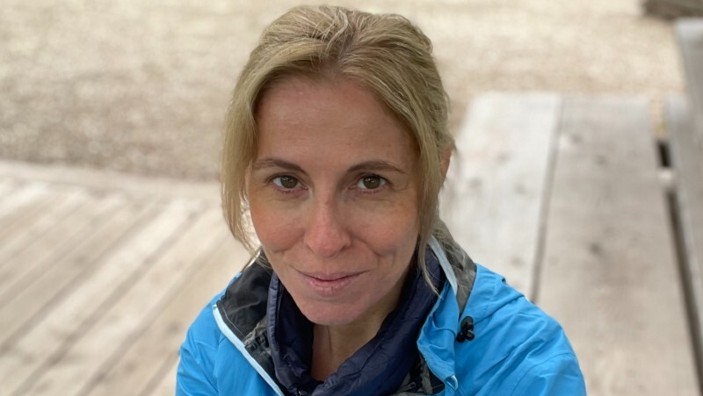
What mentoring opportunities were there on the MBA?
I enrolled on the Cambridge MBA in 2008 and after just a couple of months, one of the largest financial crises in history struck the planet. Many of us started businesses or switched careers, and mentoring was one of the key drivers for our class. I received mentorship during the CVP (Cambridge Venture Project) and GCP (Global Consulting Project, where I worked with Nike). My study and GCP team were excellent mentors, bringing incredibly diverse experiences.
How did the MBA encourage you to support and help others more generally?
There was a real emphasis on community, collaboration and empowering leadership at Cambridge Judge. The Management Praxis course also really helped me support others and provided me with many of the insights and tools, that I use today in building relationships in my organisation, and in managing a team of over 40 brilliant colleagues.
You recently became a mentor for Women in Tech – what was your motivation for joining?
I joined the UK chapter of the organisation to share my experience and support more junior women in their journey. Seeing someone succeed that other women can relate to makes the possibility real.
How do men come into play when it comes to supporting women in business?
Men can be invaluable mentors (one of my most crucial mentors is a man). Some of the most successful and brilliant leaders I know are men who are allies and understand the benefits of promoting gender equality and work, in partnership with women.
But I’m gender-neutral when it comes to supporting humans in the workplace. In our society, we have single fathers raising families and often facing similar challenges to single mothers in the workplace, so I look at people in my team and beyond and their personal situation to provide the support they need.
How can MBA students and others in the early stages of their career find a mentor?
It’s about recognising those that aren’t just great at what they do but also have an interest in giving back. It’s useful if there’s a reciprocity element – what can you share that could be valuable to them? Then ask for the first meeting – a coffee or video call is low commitment but will give you a chance to better understand if they’re the right fit for you. Once you have a mentor, it’s important to nurture the relationship and take the time to connect with the other person. Keep them updated on your progress, offer to help and show you appreciate their time and guidance – it can make all the difference to your career.
Men can be invaluable mentors – one of my most crucial mentors is a man. Some of the most successful and brilliant leaders I know are men who are allies and understand the benefits of promoting gender equality and work, in partnership with women.
The Cambridge MBA
A one-year MBA degree from Cambridge Judge Business School, at the heart of the University of Cambridge.
Find our more about women and the Cambridge MBA
Introduce yourself to us to hear about admissions events and news from the MBA, register your interest with us.
Related articles
Student and alumni news
Cambridge MBAs on building beauty, fashion and health brands
The multi-billion-pound global beauty and fashion market offers MBAs an attractive landscape to apply their skills. It provides diverse career opportunities, from sustainable startups to strategic roles in multinational brands, although it is a highly competitive industry sector.
Student and alumni news
Women in real estate – MBA alumna forges global network
After graduating with her MBA in 2020, Sheena Saraf founded the Oxford and Cambridge Built Environment Alumni Club. She shares her Cambridge experience and insights on women in real estate.
Programme news
Forté Fellowship female scholars celebrate starting MBA year
Discover the Forté Fellowship recipients of the MBA Class of 2024, celebrating gender diversity with 47% female representation in this year's cohort.


